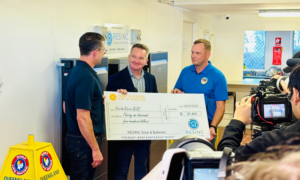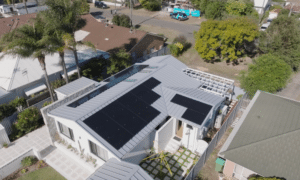The Clean Energy Regulator (CER) has changed the rooftop solar installation rules under the federal government’s SRES rebate scheme.
The CER now allows rooftop PV systems to be conducted by several installers under strict conditions.
- A notification prior to the installation must be submitted to the CER that details the fill-in installers, their credentials, and the reason they are needed.
- The eligibility of the PV system for the Small-scale Technology Certificates (STCs) will be considered.
- All installers should have an electrical license and be CEC accredited to install solar PV systems.
- On-site evidence, such as selfies, must be gathered from accredited installers.
- The installer responsible for system commissioning should ensure all prior installation work is fully compliant, meets relevant standards and was performed by accredited installers.
- The installer who commissions must sign the declaration for being on-site and will be listed as the responsible installer on the STC application form registered as the installer in the REC registry, and the contact should adverse findings during inspection of the installation be found.

A Suite of Reforms
These new regulations follow the recently-released federal government-backed rules to eliminate unreliable rooftop solar operators and retail and installation practices.
A draft form was released in November based on the 63-page Integrity Review of the Rooftop Solar PV Sector findings that Angus Taylor commissioned in mid-2020. There were 13 recommendations in the Renewable Energy Amendment Regulations 2021, and the new rules began rolling out on 1 April in different stages and will continue throughout this year.
The big change mainly revolves around proper and more in-depth documentation required from rooftop solar installers, designers, agents, and retailers when making claims for STCs.
For designers and installers, they will need to include a written compliance statement that confirms they meet relevant design and installation standards based on the requirements of the Small-scale Renewable Energy Scheme (SRES) and local, state and territory rules.
It should also confirm that the installer has the design copy and the system was installed by the book, including electric work approved under the SRES.
For retailers, they are now required to write a written statement that will confirm the following details:
- Installer name
- Whether the installer is an employee or subcontractor
- The unit is complete and generating or can generate
- If applicable, the unit is connected to the grid, or its obligations are fulfilled related to grid connection
- The solar system will perform under the contract, which includes all relevant details like solar feed-in tariffs and grid export limits.
When it comes to agents, they will need to provide a mandatory declaration where the system owner assigns the right to create STCs for the registered agent. They should also provide information on whether the inverter serial number/s entered into the REC registry is the same serial number/s installed at the address.
The Need for Stricter Rooftop Solar Installations Across Australia
Solar power is booming across the country, and recorded in 2020 , more solar PV systems will be installed in the first nine months than in any previous year. With that, almost one in four Australian households have rooftop solar panels.
Unfortunately, there is also an increasing number of solar panel incidents reported by fire and emergency services. In just three months late last year, Fire and Rescue NSW already reported 30 blazed sparked by panels, and this all points to badly installed and unsafe rooftop systems.
It is found that it’s not the actual panels causing these incidents but the components like the DC isolators and inverters. A DC isolator is a switch located next to a solar panel that shuts off the DC current between the array and the inverter. Initially, it is placed there as an extra safety feature, but the switches have caused more problems, specifically when they are not installed properly or when poor-quality components are used.
The Importance of Consumer Knowledge
Consumer knowledge regarding solar systems is below average, which means that many homeowners may have little to no idea if their solar panels are working properly.
There are several things to help you keep your home safe from fires. What are they?
Check if the Solar Panels are Dirty
Step out of your home and find the perfect spot to get a quick view of the solar panels installed on your roof. Usually, dirt won’t be a problem when there’s regular rainfall in the area. However, if there’s a build-up of dust, bird droppings, tree sap, and other debris especially during a long dry period, you can hose from the ground to wash them off of the panels.
Check the Inverter
A lot of homeowners don’t check their inverter, but this is something that you must do to ensure that it is working correctly and safely. All you need is a simple check to see the colour of the lights shining on the box during daylight when the system is running. A green light means the system is working properly, while a red or orange light means there’s an issue with the system.
When you see a red or orange flashing light, check for an error code on display. You can also check the user interface of the inverter via a web portal to know the cause. It’s best to call the installer when you see an error message, and this is also why you should check your inverters regularly.
Have Solar Panels Serviced
Solar panel maintenance is important. You should have your solar system serviced at least once every two years. Your installer will specify how frequent servicing should take place, and they are usually the one who will do it.
On the other hand, if your installer can’t do it, make sure you find a qualified, licensed A-Grade electrician to do it for you and is accredited by the CEC.
Get a quick solar quote, or contact us today toll-free on 1800 EMATTERS or email our friendly team for expert, obligation-free advice!












































